
Dominican Republic protests against electoral irregularities
On February 16, elections for all local governments in the Dominican Republic were to be held, however, they were cancelled 4 hours after they had begun.
The Dominican Republic has now completed a week of protests, joining the group of Latin American countries where citizen discontent has put their politicians in check.
The citizen mobilization arose from the irregularities and deficiencies in the electoral process of February 16, which were so numerous and serious that, finally, the elections had to be cancelled after only four hours of the beginning of the day. The irregularities were caused by the use, for the first time, of an electronic voting system on the island in 18 of its 158 municipalities.
In response, the central government has requested an investigation by the Organization of American States (OAS), to determine what was the reason for the malfunctioning of the equipment on which the Dominican government would have spent approximately 19 million of American dollars.
With only a few months left before the end of this presidential term, the Administrative Minister of the Presidency has come to say that the cacerolazos do not concern this government, but should be a cause for concern for anyone who comes. This cynical statement, moreover, ignores an important component of the citizen discontent that has ignited the mobilizations, which are not only fed by the electoral fiasco.
In June last year, the current president, Danilo Medina, made it known to the country that he was thinking of running for a second re-election, even though the country's constitution forbids it.
RELATED CONTENT
Starting a new presidential race would have required a modification of the constitution, something that the Dominican Republic is no stranger to: in its 176 years of republican life, it has made 39 modifications to its constitution. That is to say, one every four and a half years, on average. Of these 39 modifications, 32 have been linked to electoral issues.
In this order of ideas, if Medina decided not to modify the constitution it was not because of his reverence for the Magna Carta but because of the enormous political cost that the mere mention of the possibility had.
Thus, when on Sunday, February 16, election day was cancelled, Dominicans took to the streets not only because of the understandable indignation at the failure of such an important day for the definition of a country's destiny, but also because they had the fresh background of their president's effort to perpetuate himself in power.
The streets are filled with the tinkling of pots and pans and the slogan "Es pa'fuera que van" (You're going out), in which the citizens' marches have refused to get involved with opposition party demonstrations. To the point, even, that they have announced their withdrawal from the square where some group of a political party arrives.
The new date for the elections was set for 15 March and today a meeting was held between the Central Electoral Board ( JCE) and the various political parties to review the paper ballots to be used on that day. However, following the comment of the Administrative Minister of the Presidency, little can be expected from the government's willingness to overcome the crisis.
In the midst of social chaos, the President of the Dominican Society of Pneumology and Thorax Surgery, Ivelisse Acosta, has raised the alarm so that the Dominican government does not neglect another equally imminent crisis on a global scale: the COVID-19. While no cases of COVID-19 have been reported in Latin America to date, and the number of patients who have recovered is now over 25,000, a failure to contain the epidemic could have terrible consequences for the entire region.











LEAVE A COMMENT: